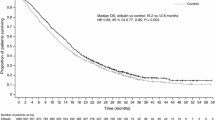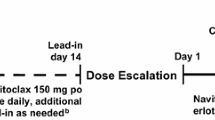Abstract
Purpose To evaluate the efficacy and safety of erlotinib in advanced breast cancer. Experimental design Multicenter, phase II study of erlotinib (150 mg orally daily). Cohort 1: progression after anthracyclines, taxanes, and capecitabine (n = 47). Cohort 2: progression after >1 chemotherapy for advanced-stage disease (n = 22). Primary endpoint was response rate (World Health Organization criteria). Secondary endpoints were safety, time to progression, and survival. Results One patient in each cohort (n = 2, 3.0%) had a partial response. Response duration was 17 weeks for the Cohort 1 patient and 32 weeks for the Cohort 2 patient. Median time to progression was 43 days for Cohort 1 (range 1–204) and 43 days for Cohort 2 (range 25–419). Common adverse events were diarrhea, rash, dry skin, asthenia, nausea, anorexia. Conclusion Erlotinib had minimal activity in unselected previously treated women with advanced breast cancer. Predictive factors are needed to identify breast cancer patients who may derive benefit from erlotinib treatment.
Similar content being viewed by others
References
Arteaga CL (2002) Epidermal growth factor receptor dependence in human tumors: more than just expression? Oncologist 7(Suppl 4):31–39. doi:10.1634/theoncologist.7-suppl_4-31
Shepherd FA, Rodrigues Pereira J, Ciuleanu T et al (2005) Erlotinib in previously treated non-small-cell lung cancer. N Engl J Med 353:123–132. doi:10.1056/NEJMoa050753
Moore MJ, Goldstein D, Hamm J et al (2007) Erlotinib plus gemcitabine compared with gemcitabine alone in patients with advanced pancreatic cancer: a phase III trial of the National Cancer Institute of Canada Clinical Trials Group. J Clin Oncol 25:1960–1966. doi:10.1200/JCO.2006.07.9525
Erbitux® [package insert 11/07]. ImClone Systems Incorporated, New York, NY; Bristol-Myers Squibb Company, Princeton, NJ
Vectibix™ [package insert 10/07]. Amgen Inc., Thousand Oaks, CA
Klijn JG, Berns PM, Schmitz PI, Foekens JA (1992) The clinical significance of epidermal growth factor receptor (EGF-R) in human breast cancer: a review on 5232 patients. Endocr Rev 13:3–17. doi:10.1210/er.13.1.3
Sainsbury JR, Farndon JR, Needham GK, Malcolm AJ, Harris AL (1987) Epidermal-growth-factor receptor status as predictor of early recurrence of and death from breast cancer. Lancet 1:1398–1402
Suo Z, Risberg B, Kalsson MG et al (2002) EGFR family expression in breast carcinomas. c-erbB-2 and c-erbB-4 receptors have different effects on survival. J Pathol 196:17–25. doi:10.1002/path.1003
Piccart-Gebhart MJ, Procter M, Leyland-Jones B et al (2005) Trastuzumab after adjuvant chemotherapy in HER2-positive breast cancer. N Engl J Med 353:1659–1672. doi:10.1056/NEJMoa052306
Romond EH, Perez EA, Bryant J et al (2005) Trastuzumab plus adjuvant chemotherapy for operable HER2-positive breast cancer. N Engl J Med 353:1673–1684. doi:10.1056/NEJMoa052122
Slamon DJ, Leyland-Jones B, Shak S et al (2001) Use of chemotherapy plus a monoclonal antibody against HER2 for metastatic breast cancer that overexpresses HER2. N Engl J Med 344:783–792. doi:10.1056/NEJM200103153441101
DiLeo A, Gomez H, Aziz Z et al (2007) Lapatinib (L) with paclitaxel compared to paclitaxel as first-line treatment for patients with metastatic breast cancer: a phase III randomized, double-blind study of 580 patients. J Clin Oncol 25:1011
Geyer CE, Forster J, Lindquist D et al (2006) Lapatinib plus capecitabine for HER2-positive advanced breast cancer. N Engl J Med 355:2733–2743. doi:10.1056/NEJMoa064320
Anido J, Matar P, Albanell J et al (2003) ZD1839, a specific epidermal growth factor receptor (EGFR) tyrosine kinase inhibitor, induces the formation of inactive EGFR/HER2 and EGFR/HER3 heterodimers and prevents heregulin signaling in HER2-overexpressing breast cancer cells. Clin Cancer Res 9:1274–1283
Emlet DR, Brown KA, Kociban DL et al (2007) Response to trastuzumab, erlotinib, and bevacizumab, alone and in combination, is correlated with the level of human epidermal growth factor receptor-2 expression in human breast cancer cell lines. Mol Cancer Ther 6:2664–2674. doi:10.1158/1535-7163.MCT-07-0079
Albain K, Elledge R, Gradishar W (2002) Open-label, phase II, multicenter trial of ZD 1839 (‘Iressa’) in patients with advanced breast cancer. San Antonio Breast Cancer Symposium (SABCS). Breast Cancer Res Treat 76(suppl 1):S33. Abstract 20
Baselga J, Albanell J, Ruiz A et al (2005) Phase II and tumor pharmacodynamic study of gefitinib in patients with advanced breast cancer. J Clin Oncol 23:5323–5333. doi:10.1200/JCO.2005.08.326
Modi S, D’Andrea G, Norton L et al (2006) A phase I study of cetuximab/paclitaxel in patients with advanced-stage breast cancer. Clin Breast Cancer 7:270–277
Lu JF, Eppler SM, Wolf J et al (2006) Clinical pharmacokinetics of erlotinib in patients with solid tumors and exposure-safety relationship in patients with non-small cell lung cancer. Clin Pharmacol Ther 80:136–145. doi:10.1016/j.clpt.2006.04.007
Trotti A, Byhardt R, Stetz J et al (2000) Common toxicity criteria: version 2.0. an improved reference for grading the acute effects of cancer treatment: impact on radiotherapy. Int J Radiat Oncol Biol Phys 47:3–47
Therasse P, Arbuck SG, Eisenhauer EA et al (2000) New guidelines to evaluate the response to treatment in solid tumors. European Organization for Research and Treatment of Cancer, National Cancer Institute of the United States, National Cancer Institute of Canada. J Natl Cancer Inst 92:205–216. doi:10.1093/jnci/92.3.205
Cassella G (1986) Refining binomial confidence intervals. Can J Stat 14:113–129. doi:10.2307/3314658
Meier P, Kaplan E (1958) Nonparametric estimation from incomplete observations. J Am Stat Assoc 53:457–481. doi:10.2307/2281868
Cohen MH, Johnson JR, Chen YF, Sridhara R, Pazdur R (2005) FDA drug approval summary: erlotinib (Tarceva) tablets. Oncologist 10:461–466. doi:10.1634/theoncologist.10-7-461
Gordon AN, Finkler N, Edwards RP et al (2005) Efficacy and safety of erlotinib HCl, an epidermal growth factor receptor (HER1/EGFR) tyrosine kinase inhibitor, in patients with advanced ovarian carcinoma: results from a phase II multicenter study. Int J Gynecol Cancer 15:785–792. doi:10.1111/j.1525-1438.2005.00137.x
Perez-Soler R, Chachoua A, Hammond LA et al (2004) Determinants of tumor response and survival with erlotinib in patients with non—small-cell lung cancer. J Clin Oncol 22:3238–3247. doi:10.1200/JCO.2004.11.057
Baselga J (2002) Targeting the epidermal growth factor receptor with tyrosine kinase inhibitors: small molecules, big hopes. J Clin Oncol 20:2217–2219. doi:10.1200/JCO.2002.03.100
Carey LA, Mayer E, Marcom PK et al (2007) EGFR inhibition with cetuximab in metastatic triple negative (basal-like) breast cancer. Abstract from BCRT Proceedings. Breast Cancer Res Treat 106(suppl 1):S32. Abstract 307
Shigematsu H, Lin L, Takahashi T et al (2005) Clinical and biological features associated with epidermal growth factor receptor gene mutations in lung cancers. J Natl Cancer Inst 97:339–346
Eberhard DA, Johnson BE, Amler LC et al (2005) Mutations in the epidermal growth factor receptor and in KRAS are predictive and prognostic indicators in patients with non-small-cell lung cancer treated with chemotherapy alone and in combination with erlotinib. J Clin Oncol 23:5900–5909. doi:10.1200/JCO.2005.02.857
Di Fiore F, Blanchard F, Charbonnier F et al (2007) Clinical relevance of KRAS mutation detection in metastatic colorectal cancer treated by cetuximab plus chemotherapy. Br J Cancer 96:1166–1169. doi:10.1038/sj.bjc.6603685
Khambata-Ford S, Garrett CR, Meropol NJ et al (2007) Expression of epiregulin and amphiregulin and K-ras mutation status predict disease control in metastatic colorectal cancer patients treated with cetuximab. J Clin Oncol 25:230–237. doi:10.1200/JCO.2006.10.5437
Lievre A, Bachet JB, Le Corre D (2006) KRAS mutation status is predictive of response to cetuximab therapy in colorectal cancer. Cancer Res 66:3992–3995. doi:10.1158/0008-5472.CAN-06-0191
Amado RG, Wolf M, Peeters M et al (2008) Wild-type KRAS is required for panitumumab efficacy in patients with metastatic colorectal cancer. J Clin Oncol 26:1626–1634. doi:10.1200/JCO.2007.14.7116
Polychronis A, Sinnett HD, Hadjiminas D et al (2005) Preoperative gefitinib versus gefitinib and anastrozole in postmenopausal patients with oestrogen-receptor positive and epidermal-growth-factor-receptor-positive primary breast cancer: a double-blind placebo-controlled phase II randomised trial. Lancet Oncol 6:383–391. doi:10.1016/S1470-2045(05)70176-5
Arteaga CL, O’Neil A, Moulder SL (2004) ECOG1100: a phase I-II study of combined blockade of the erbB receptor network with trastuzmab and gefitinib (‘Iressa’) in patients (pts) with HER2-overexpressing metastatic breast cancer (met br ca). Proceedings BCRT (SABCS 2004). Breast Cancer Res Treat 88:S15. Abstract 25
Smith IE, Walsh G, Skene A et al (2007) A phase II placebo-controlled trial of neoadjuvant anastrozole alone or with gefitinib in early breast cancer. J Clin Oncol 25:3816–3822. doi:10.1200/JCO.2006.09.6578
Bishop PC, Myers T, Robey R et al (2002) Differential sensitivity of cancer cells to inhibitors of the epidermal growth factor receptor family. Oncogene 21:119–127. doi:10.1038/sj.onc.1205028
Yamasaki F, Zhang D, Bartholomeusz C et al (2007) Sensitivity of breast cancer cells to erlotinib depends on cyclin-dependent kinase 2 activity. Mol Cancer Ther 6:2168–2177. doi:10.1158/1535-7163.MCT-06-0514
Jones HE, Goddard L, Gee JM et al (2004) Insulin-like growth factor-I receptor signalling and acquired resistance to gefitinib (ZD1839; Iressa) in human breast and prostate cancer cells. Endocr Relat Cancer 11:793–814. doi:10.1677/erc.1.00799
Acknowledgments
We thank OSI Pharmaceuticals for providing erlotinib and all investigators in the OSI2288g study group: Louis Fehrenbacher, George Geils, Carolyn Britten, Joanne Mortimer, Ray Page and Charles Shapiro. Genentech, Inc. provided support for the clinical trial and manuscript preparation.
Author information
Authors and Affiliations
Corresponding author
Rights and permissions
About this article
Cite this article
Dickler, M.N., Cobleigh, M.A., Miller, K.D. et al. Efficacy and safety of erlotinib in patients with locally advanced or metastatic breast cancer. Breast Cancer Res Treat 115, 115–121 (2009). https://doi.org/10.1007/s10549-008-0055-9
Received:
Accepted:
Published:
Issue Date:
DOI: https://doi.org/10.1007/s10549-008-0055-9




